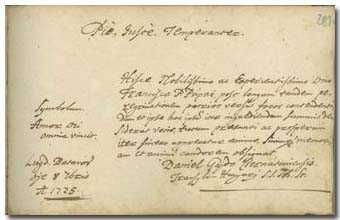
Piè. Justè. Temperanter.
Hisce Nobilissimo ac Experientissimo D[omi]no Francisco P. Pápai,
post longam tandem peregrinationem patrios versus focos
contendenti, dum et ipse hoc ipsius iter ingrediendum summis
desiderat votis, tutum praeeunti ac prosperum iter sincero
apprecatur animo, suamque memoriam et animi candorem obsignat
Daniel Gajdo Csernátoniensis
Transylv[ano]-Hungarus, S. S. Th[eologiae] St[udiosus]
Symbolum. Amor Dei omnia vincit. *
Lugd[uni] Batavorum die 8 7bris A. 1725
|
* This motto is a paraphrase of the well
known Virgilian verse “omnia vincit amor”
(Eclogae 10.69).
|
|
|
With piety, justice and temperance.
With this and with sincere heart I wish a safe
and fortunate journey to the noble and experienced Mr. Pápai
Páriz, who after a long peregrination finally turns back towards
the hearth of his home – that I myself would also like to do –,
and I recommend myself into his memory and benevolence.
Dániel Gajdó of Csernáton
Hungarian Transylvanian student of theology
Motto: The love of God conquers everything.
*
In
Leiden, on September 8, 1725.
|
281. Leiden, September 8, 1725.
Gajdó,
Dániel, of Csernáton
(1696-1749), Transylvanian
Reformed deacon
Gajdó Dániel of Csernáton (Csernátoni Gajdó Dániel) was born in 1696
in Alsócsernáton, Háromszék county (today Cernatu de Jos,
Roumania). He studied in Nagyenyed (Aiud), then from November 1721
at the university of Frankfurt an der Oder, and from September
19, 1722 at that of Leiden. He returned home in 1726. He was a
pastor in an unknown place, then from 1738 in Gyulafehérvár (Alba
Iulia). In 1749 he was elected deacon of the Reformed dioecese,
and he died on September 6 of the same year. Apart from his
funeral orations, he wrote a funeral poem on the death of Ferenc
Pápai Páriz, Sen., and a laudatory poem to Ferenc Bala, in the
book of this latter that was published in Frankfurt an der Oder in
1722 with the title Lelki élet.
Dániel Gajdó of Csernáton wrote in the album in Leiden in 1725.
Ferenc Bala, whom he greeted in a poem, and Pál Kamarási, with whom
he wrote a funeral sermon (Keserűség sírhalma …, 1733),
also wrote in the album (pp. 457,
445).
•
Graaf • Peregrinus • Szabó-Szögi 131 • Szinnyei III 933 • ÚMIL •
Zoványi-Ladányi |

